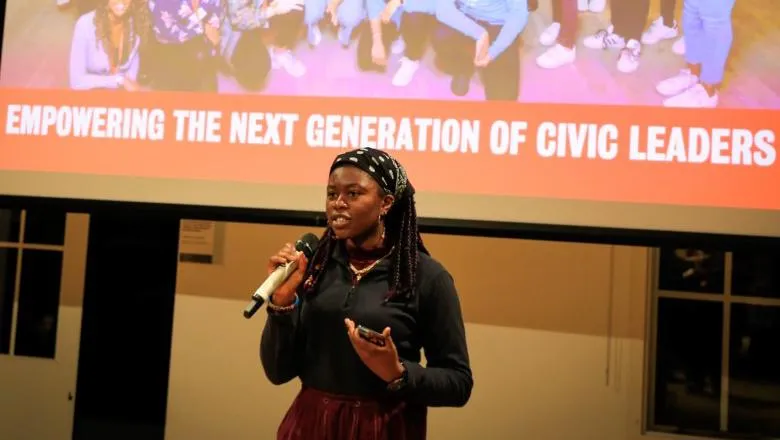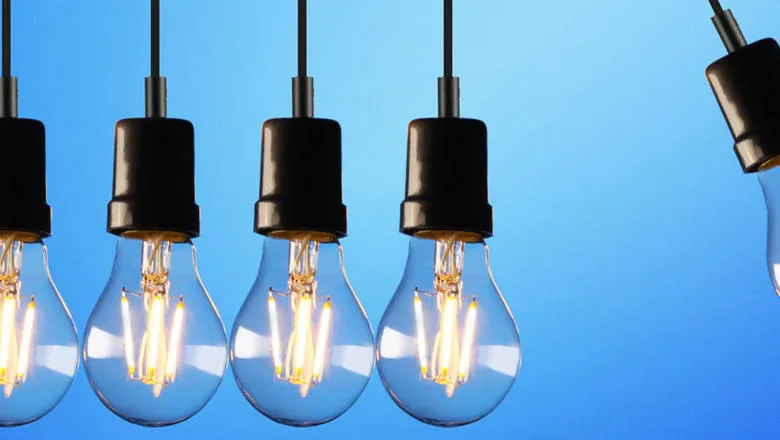My role with Fair Energy and with King’s 4 Change more generally has transformed my experience at King’s. It is hard for me to imagine life at university without this work.
Abigail Oyedele
02 June 2021
Campaigning for Fair Energy with Citizens UK
Final year student Abigail Oyedele on volunteering in our local communities

Abigail Oyedele is a final year Global Health and Social Medicine student, who is committed to raising awareness of social injustice around the world and combating the problems faced by people in low- and middle- income countries. In 2019 she co-founded King’s 4 Change, a student community organising group that works with Citizens UK to train and engage students in campaigns both at King’s College London and across London. In 2020 Abigail was named South London Citizens Leader of the Year for the positive impact she has had on local communities.
Abigail tells us about her role in supporting Citizens UK’s Fair Energy Campaign.
Why did you want to become involved in the Fair Energy Campaign?
Before getting involved in the Fair Energy Campaign, King’s 4 Change had been working on another Citizens UK campaign called Just Transition. The aim of the Just Transition campaign is for London to transition into a net zero carbon emissions city in a way that is equitable and beneficial for disadvantaged groups. King’s 4 Change was involved in city-wide listening for Just Transition and when that finished, we were looking for ways to promote the campaign at King’s and make change at a local level. The Fair Energy Campaign seemed like the perfect opportunity to do just that – both campaigns focus not only on climate justice but also social and economic justice and seek to make climate action more inclusive and responsive to the needs of marginalised people. The issues my community was wrestling with were reflected in these campaigns.
One strength of the Fair Energy Campaign is that it shows how easy it is for individuals to make tangible change for themselves and for their planet – it is empowering. Another strength is that it is accessible to anyone, not just young, well-off liberals, who we usually associate with climate activism. This is what most attracted me to the campaign.
What does your voluntary role involve?
A great thing about the Fair Energy team is that we are tight-knit and flexible so there are no concrete roles. Generally, it has been my job to bring in community organising insights from my training with Citizens UK. The Fair Energy Campaign was created and grown through community organising methods, so I ensure that we use these methods internally as a team as well as teaching them during our events. For example, a core tenet of organising is the relational 121 conversation. You are much more likely to get people to turn up for an event if you have conversations with them and understand how the event speaks to their interests, than if you drop a message on a group chat. Moreover, 121s enable you to build lasting relationships that can result in long-term engagement with the campaign instead of one-off event attendance. So, in our last Fair Energy webinar, I taught about this, and the importance of understanding the self-interest of others when trying to encourage them to switch energy providers. Reducing their carbon footprint will be the concern of some, whilst others will be more interested in saving money. I hope to develop on this in our next event on 7 June for Volunteers’ Week.
What has been a key highlight of your volunteering experience so far?
My highlight has been the Fair Energy webinar we ran on 25 March for King’s Global Day of Service. We not only had King’s staff and students present but also people from our local community – churches, schools, even our family members! It was wonderful to see how people got to know each other in the breakout rooms and how they engaged with the issues we were presenting. The webinar was also an opportunity for three relatively new members of the team to lead which was hugely rewarding to see and showed that the campaign would continue at King’s after I graduate this year. Our team has continued to grow since then which is very exciting!
What are the personal benefits you have gained from your involvement in the Fair Energy Campaign?
I have gained a bunch of benefits from my experience with Fair Energy. On a technical level my understanding of the energy market has improved from non-existent to reasonable which is very handy. More importantly, I have met many people from outside my immediate university circle who I would not have met otherwise: students from other departments, including postgraduate students, staff members, members of Fair Energy campaigns in other institutions, Citizens UK organisers, the list goes on. Everyone has different perspectives on the campaign and different ideas for how we can best reach our objectives, so there has been much to learn. I hope to maintain these relationships after I have left King’s and continue to contribute to the work of this campaign and others where I can. My organisational skills have also improved because I have had to balance this campaign with other King’s 4 Change activities and the final year of my degree. I have learnt how to best prioritise and how to say no when I have too much on my plate.
Find out more and get involved

- Find out more joining King’s 4 Change on their Instagram
- Inspired by Abigail’s story? Apply for Community organising Training with Citizens UK
Has your voluntary role strengthened your studies or enhanced your student experience?
My role with Fair Energy and with King’s 4 Change more generally has transformed my experience at King’s. It is hard for me to imagine life at university without this work. One might assume that having responsibilities in addition to your degree would be exhausting but the Fair Energy Campaign actually provides some respite from the pressures of my degree. It has also helped me apply the theoretical content I have learnt about in my studies to the real world and the problems of people in my community. Through this I have seen that sometimes the academic theories are far removed from the issues on the ground. Lastly, I have really valued the social aspect of the campaign which has been mostly lacking at university due to online learning. We have enjoyed talking about things other than exams and assignments!
What advice would you give to someone hoping to become involved in a similar campaign?
I would say two things: firstly, try not to worry that it will be too much to juggle with your studies and other commitments. Grassroots campaigns like Just Transition and Fair Energy are led and energised by the people. You will not be trying to meet the demands others put on you but instead you will be working for what you care about, and hopefully that enthusiasm will keep you going when things get tough or busy. The campaign should work for you and enable you to give as much as you can. Because you will be working in a team, when you need to step back, others should be able to step up.
Secondly, grasp every opportunity that comes your way. You might come into the experience with certain expectations, perhaps thinking you will be doing one role the whole way through. Although it is beneficial to focus on your main tasks, be open to trying things outside of your comfort zone. You never know who you will meet and what they could teach you.
Delivering the UN Sustainable Development Goals
King's College London has a long and proud history of serving the needs and aspirations of society. We are committed to the UN Sustainable Development Goals (SDGs) as a university, and we use them as a framework for reporting on our social impact. The SDGs are a set of 17 goals approved by the 193 member states of the United Nations (UN) which aim to transform the world by 2030. This research supports SDGs 7, 10 and 17.
